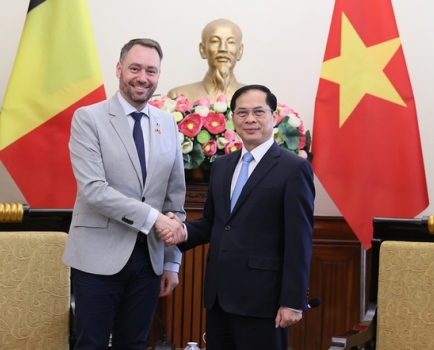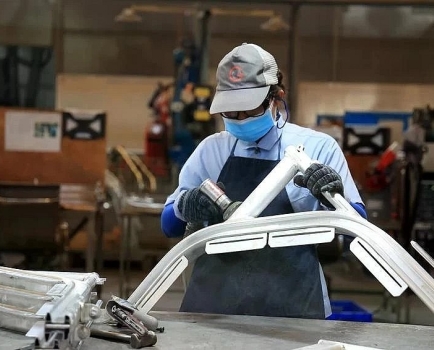Revenue faces short-term difficulties but will be more sustainable when implementing FTA
Mon, 16 Dec 2024 11:15:00 | Print | Email Share:
he National Scientific Conference under the theme “Tax management for imports and exports in the context of FTA implementation: Current situation and solutions” was jointly held by the General Department of Vietnam Customs (GDVC) and the Academy of Finance, on December 11.
 |
Deputy Director General of the GDVC Luu Manh Tuong and Assoc. Prof. Dr. Nguyen Manh Thieu, Deputy Director of the Academy of Finance co-chaired the conference.
Trade turnover surges
According to the report, in recent years, Vietnam has gained many important achievements in economic development thanks to promoting openness, integrating into the world economy, and actively participating in the network of multi-layered free trade agreements. The country has become an open economy with the trade turnover to GDP in previous years.
At the conference, Assoc. Prof. Dr. Nguyen Manh Thieu said that as of November 2024, Vietnam has signed 19 bilateral and multilateral free trade agreements (FTAs) with most countries and territories in the world, including all developed countries, emerging economies and countries in the region, such as: AFTA, ACFTA, AKFTA, AJCEP, CPTPP, UKVFTA, RCEP, EVFTA... In recent years, Vietnam has successfully negotiated and signed new generation FTAs such as CPTPP, EVFTA and RCEP.
Conference scene. Photo: H.Nu
The implementation of FTAs, especially new generation FTAs, has had multi-faceted impacts, both positive and challenging for economic sectors such as: international trade, and domestic and foreign investment...
Assessing the impact, Assoc. Prof. Dr. Nguyen Manh Thieu, said that along with the implementation of FTAs in recent times, Vietnam's trade turnover surges. The total import and export turnover of the country from 2002 to 2012 reached US$1,036 billion, while it recorded US$4,110 billion in the period 2013-2021, which is four times higher than those in the previous 10 years. The trade turnover in 2023 reached US$681.1 billion, which is 6 times higher than those in 2002-2012, increasing by 50% compared to the average year of the period 2013 - 2021.
As of November 15, the total trade turnover saw a year-on-year increase of 15.7% to US$681.14 billion, exceeding the total trade turnover of 2023.
In addition to the increase in import-export turnover, trade types and import-export goods see the diversification. Notably, the explosion of e-commerce with thousands of e-commerce platforms has increased the huge volume of small-value import-export orders. The goods imported from China to Vietnam via e-commerce platforms, there are an average of 4 to 5 million small-value orders every day. These create huge pressure and challenges, requiring comprehensive innovation in tax management activities for imported and exported goods, both in terms of management methods and technology and people performing tax management.
Enhancing competitiveness
Dr. Nguyen Dinh Chien - Faculty of Taxation and Customs, Academy of Finance further analyzed the indirect impacts.
The FTA implementation has promoted production and business, enhanced the competitiveness of Vietnamese firms. When implementing FTAs, with requirements on quality and production technology towards sustainable development, domestic enterprises are required to constantly improve production processes and product quality, meeting the requirements of large markets in FTA partners.
“This creates pressure but is also an important driving force for domestic enterprises to innovate technological processes, improve labor productivity, product quality and competitiveness, thereby continuing to expand markets and increase exports of products” - Dr. Nguyen Dinh Chien said.
Additionally, the participating in FTAs will bring opportunities to the domestic firms in accessing low-price sources of goods, advanced technology, necessary input factors for production and business activities (machinery, equipment, tools, spare parts and raw materials, etc.) from developed countries with good quality to improve labor productivity, product quality, enhance competitiveness, strongly boost the exports goods to international markets, and participate more effectively in the global supply chain.
The active negotiation and signing FTAs in recent times has helped Vietnam boost its economic and trade relations with other countries, thereby attracting foreign investors to the Vietnamese market, opening up prospects for investment and business cooperation between Vietnam and foreign investors.
 |
| Deputy Director General Luu Manh Tuong speaks at the conference. Photo: H.Nu |
In addition, the content of commitments in FTAs includes provisions related to opening up the service market, investment and policies for foreign investors. Vietnam's increasingly expanding investment fields and the contents of the origin rules in FTAs create attractiveness to attract investment from FTA partners to Vietnam.
All of the issues show that the implementation of FTAs has had a positive impact on attracting foreign investment capital to Vietnam, especially from partner countries in the FTAs.
Speaking at the conference, Deputy Director General Luu Manh Tuong said that the new generation FTAs are a breakthrough development of FTAs, exceeding the limits of traditional FTAs in both the scope of commitments and the implementation requirements, and bringing many opportunities for intra-industry trade and tax administration in Vietnam. Taking advantage of these opportunities requires a flexible and effective tax administration strategy, while overcoming existing challenges to ensure sustainable development in the context of global integration.
On May 20, 2022, the Prime Minister signed Decision No. 624/QD-TTg promulgating the Customs Development Strategy to 2030. One of the six requirements and perspectives for the development of Vietnam Customs include developing Customs to facilitate legitimate trade, combat smuggling and trade fraud; fully and comprehensively implementing international commitments singed by Vietnam on import-export taxes, customs duties and trade facilitation; effectively responding to changes related to trade defense measures in the context of many international fluctuations; improving the effectiveness and efficiency of state management of customs, contributing to improving national competitiveness, Deputy Director General said.
By: Customs News
Source: https://english.haiquanonline.com.vn/revenue-faces-short-term-difficulties-but-will-be-more-sustainable-when-implementing-fta-32489.html
---------------------------------------------
Same category News :













